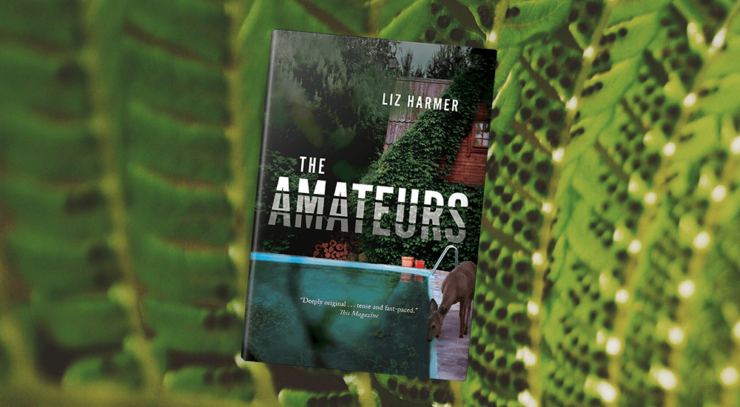Sometimes, you have an idea of what you’re getting yourself into. Case in point: before you read a word of Liz Harmer’s novel The Amateurs, you’ll encounter a comprehensive-looking table of contents. The novel, it tells you, is divided into three parts: “The Amateurs,” “The Professionals,” and “The Travellers,” each with distinctly-named chapters and a brief interlude. If you’re prone to reverse-engineering novels from their tables of contents, and I’m sure some of you are, you’ll find plenty to ponder here.
Sometimes, you have no idea of what you’re getting yourself into. Case in point: the situation faced by the world of Harmer’s novel. When the book begins, it’s the aftermath of an event that’s decimated the Earth’s population. Initially the novel centers around a small community in a Canadian city: specifically, one which is “down to forty-two, not including pets” as the novel opens. This isn’t the result of a war or a global pandemic, however—though Harmer’s novel does neatly encapsulate the tried-and-true scenario of a handful of survivors grappling with the end of the world that they’ve always known. Instead, the responsible party is a device known as Port, the invention of a tech visionary named Albrecht Doors.
Port allows people (and, it transpires, at least some animals) the ability to travel through them to a destination that fulfills their heart’s desire. And while Doors’s company released Port with the promise that a trip through it could be two-way, there’s no evidence that any of the millions of people who purchased and passed through Port have ever returned. All of which creates a growing sense of mystery: is Port genuine? Is it simply disintegrating or consuming people? Or is it as miraculous as it promises, something which genuinely makes the life of each person who passes through it infinitely better?
In the first part of The Amateurs, Harmer creates a solid balance of a lived-in setting and a high concept. At the center of the group is Marie, who finds herself thinking of her ex-husband, the end of their marriage, and the affair that they had after he remarried. She finds herself thinking of happier times, but then—wouldn’t almost anyone? Port hasn’t gone away, after all: even the stubborn forty-two who endure in this one community—who, as far as they know, are the last people on Earth—still have access to that technology. And as they look back over their lives and await an uncertain future, the allure of a gateway somewhere else endures.
It doesn’t hurt that Harmer’s description of the effects of the changed world, and how these characters perceive it, resonates deeply. Here’s Marie musing on the space around her:
“At first she had wanted to see how bad it could get, how few people there could be, whether she could be the one to outlast. She had wanted a test of her endurance, a way of discovering for herself what the marathoner wants to know. And then one day she had looked down into the solemn street, and it was so beautiful.”
Buy the Book


The Amateurs
The second part of The Amateurs focuses on Brandon, a member of Doors’s inner circle, and fills in a host of information about the origin of Port and of how the tech world is grappling with the disappearance of most of humanity. A discovery at the end of the first part leads thematically into the second’s shift in focus, allowing for two distinct riffs on the idea of coping with the end of everything.
It’s a metaphorically rich concept, and Harmer keeps a solid balance between the ambiguity and the worldbuilding. Ultimately, she does provide some clarification on what Port is—but what endures after reading this novel are the characters, their hesitant connections, and the idea that the end of world as we know it might be cause for celebration. Late in the novel, one character asks, “Why is every song about leaving or returning?” That goes for stories, too. Sometimes, though, they’re about both. And sometimes, they’re about how one is just a form of another. This novel weds a high concept to an abundance of heart; like the mysterious passages in it, it’s hard to shake.
The Amateurs is available from Vintage Canada.
Book cover: Vintage Canada; Background image: Public Domain.
 Tobias Carroll is the managing editor of Vol.1 Brooklyn. He is the author of the short story collection Transitory (Civil Coping Mechanisms) and the novel Reel (Rare Bird Books).
Tobias Carroll is the managing editor of Vol.1 Brooklyn. He is the author of the short story collection Transitory (Civil Coping Mechanisms) and the novel Reel (Rare Bird Books).










